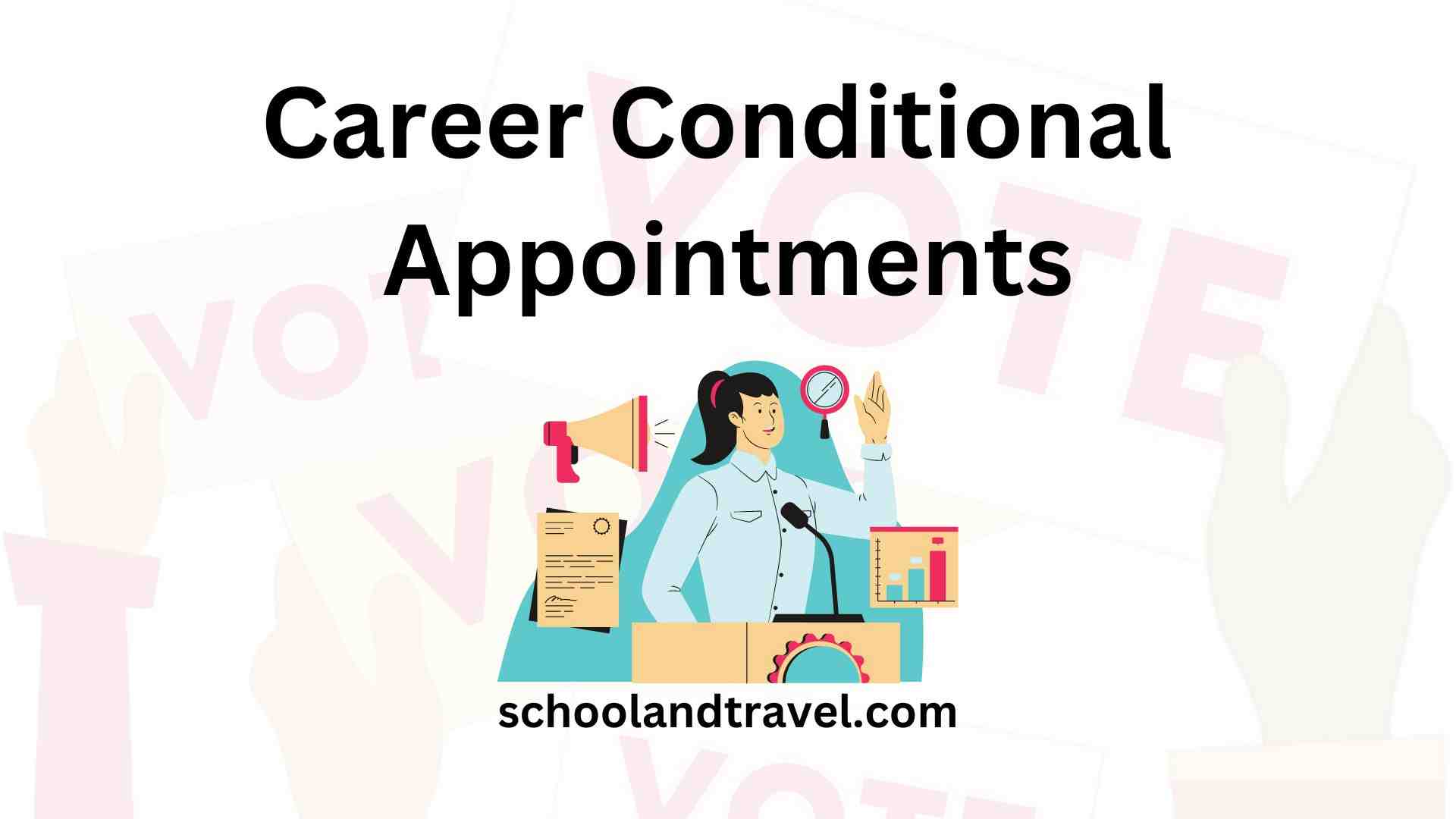A career-conditional appointment is a term used in the context of federal government employment.
It refers to a probationary period during which newly hired employees are evaluated for suitability and performance.
This article aims to explain career-conditional appointments, including their purpose, eligibility criteria, and the benefits and challenges they entail.
By exploring this topic, readers will gain insights into the unique dynamics of federal employment and the pathway to achieving career status.
What are Career Conditional Appointments?
Career conditional appointments are an essential aspect of federal government employment.
When individuals are hired into certain positions, they enter a probationary period known as a career-conditional appointment.
During this period, which typically lasts one to three years, employees are evaluated to determine their job performance, adherence to regulations, and overall suitability for the position.
This evaluation period allows federal agencies to assess the capabilities and conduct of newly hired employees before granting them permanent employment status.
It serves as a mechanism for maintaining a competent and effective workforce within the federal government, ensuring that individuals meet the required standards and demonstrate their ability to fulfill the responsibilities of their positions.
Career conditional appointments play a crucial role in upholding the principles of merit-based hiring and effective performance management in the federal government.
Eligibility for a Career Conditional Appointment
Eligibility for a career-conditional appointment in the federal government involves meeting specific criteria and going through a structured hiring process.
Here are the key elements of the eligibility process:
1. Qualifications
Individuals must possess the required qualifications to be eligible for a career-conditional appointment.
This includes meeting the job announcement’s education, experience, and skill requirements.
2. Application
Candidates must submit an accurate application for the position through the designated application system.
This includes providing relevant personal information, educational background, work experience, and other required documentation.
3. Assessment
The hiring agency will review applications and assess candidates based on their qualifications and suitability.
This may involve screening applications, conducting interviews, administering tests or assessments, and checking references.
4. Selection
After assessing all eligible candidates, the hiring agency will select the most qualified individuals for further consideration.
The selection process may involve a review board, panel interviews, or other evaluation methods to determine the best fit for the position.
5. Offer of Employment
Once the selection process is complete, the hiring agency will extend a formal offer of employment to the selected candidate.
This offer will outline the terms and conditions of the career-conditional appointment, including the duration of the probationary period.
It’s important to note that eligibility requirements and processes may vary across federal agencies and job positions.
Candidates should carefully review the job announcements and follow the instructions provided by the hiring agency to ensure they meet the specific requirements and submit a competitive application.
Benefits and Protections for Career Conditional Employees
Career-conditional employees in the federal government are entitled to various benefits and protections.
Here are some key benefits and protections that career-conditional employees can expect:
1. Competitive Salary
Career-conditional employees receive a competitive salary based on their position, grade level, and years of experience.
The federal government offers a structured pay system that ensures employees are compensated fairly.
2. Health and Retirement Benefits
Career-conditional employees are eligible for a comprehensive benefits package, including health insurance, retirement plans, and life insurance.
These benefits provide financial security and support for employees and their families.
3. Job Security
Career-conditional employees have greater job security than employees on temporary or term appointments.
They enjoy the expectation of continued employment as long as they perform their duties satisfactorily and meet the requirements of their position.
4. Career Advancement Opportunities
Career-conditional employees have the opportunity for career growth and advancement within the federal government.
They can apply for promotions, transfer to other agencies or departments, and access professional development programs to enhance their skills and qualifications.
5. Employment Protections
Career-conditional employees are protected by various employment laws and regulations, including anti-discrimination laws and regulations governing employee rights.
They have the right to fair treatment, workplace safety, and access to grievance procedures if necessary.
Career-conditional employees need to familiarize themselves with the benefits and protections their employing agency offers.
Each agency may have policies and guidelines regarding employee benefits, career development, and employment protections.
Read More:
- Is Transportation Services A Good Career Path? (FAQs)
- Is Property-Casualty Insurers A Good Career Path? (FAQs)
- Is Paints/Coatings A Good Career Path? (FAQs)
- How to Become a Butcher (Career, Steps, Skills, FAQs)
Conversion to Career Status
Conversion to career status refers to how career-conditional employees transition to a permanent career appointment in the federal government.
This conversion typically occurs upon completing the probationary period and meeting all the requirements.
The specific criteria and procedures for conversion vary depending on the agency and the position.
Generally, career-conditional employees must demonstrate satisfactory performance, adherence to agency policies and procedures, and meet any additional qualifications or certifications required for the position.
During the probationary period, supervisors and managers closely evaluate the employee’s performance and conduct regular assessments to assess their suitability for continued employment.
If the employee meets or exceeds expectations and demonstrates the necessary skills, knowledge, and abilities, they may be recommended for conversion to career status.
The conversion process may involve documentation, such as a formal request from the supervisor or manager, completion of paperwork, and approval from the appropriate authority within the agency.
Once the conversion is approved, the employee becomes a permanent career employee, gaining additional job security and benefits.
It is essential for career-conditional employees to actively seek feedback, participate in professional development opportunities, and demonstrate their commitment to their roles and the agency’s mission.
Doing so increases their chances of successfully transitioning to career status and enjoying its long-term benefits and stability.
Frequently Asked Questions: Career conditional appointments.
A career-conditional appointment is a temporary employment status in the federal government subject to specific eligibility requirements and a probationary period. On the other hand, a career appointment is a permanent employment status typically granted after completing the probationary period and meeting all the necessary criteria.
The length of the probationary period for career-conditional employees varies depending on the agency and position. It typically ranges from 1 to 2 years. Employees are evaluated based on their performance, adherence to policies and procedures, and overall suitability.
Yes, career-conditional employees are eligible for various benefits, including health insurance, retirement plans, paid leave, and other federal employee benefits. These benefits contribute to their overall compensation and well-being.
Yes, career-conditional employees have the opportunity for professional growth and advancement within the federal government. They can be considered for promotions, transfers to other positions or agencies, and career development opportunities based on their performance and qualifications.
If a career-conditional employee fails to meet the requirements or perform satisfactorily during the probationary period, their employment may be terminated. However, agencies typically provide feedback, support, and opportunities for improvement throughout the probationary period to help employees succeed.
Conclusion
In conclusion, a career-conditional appointment is a type of employment status in the federal government that allows individuals to establish long-term careers.
It provides a pathway to permanent employment, offering job security, competitive compensation, comprehensive benefits, and professional growth and advancement opportunities.
While career-conditional employees must fulfill specific requirements and undergo a probationary period, they can access various benefits and protections contributing to their overall well-being and job satisfaction.
Understanding the process and benefits of career-conditional appointments is crucial if you are considering a career in the federal government.
It is a stepping stone towards a rewarding and fulfilling career in the public sector.
Awesome one; I hope this article answers your question.
Editor’s Recommendations:
- Is Computer Science A Good Career Path? (Jobs, FAQs)
- Is Coal Mining A Good Career Path? (Benefits, FAQs)
- Is Television Services A Good Career Path? (FAQs)
- Is Computer Manufacturing A Good Career Path? (FAQs)
- Is Food Distributors A Good Career Path? (FAQs)
- Is Oil/Gas Transmission A Good Career Path? (FAQs)
- Is Banking A Good Career Path? (Meaning, FAQs, Types)
If you find this article good, please share it with a friend.




